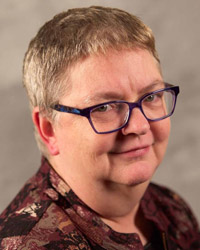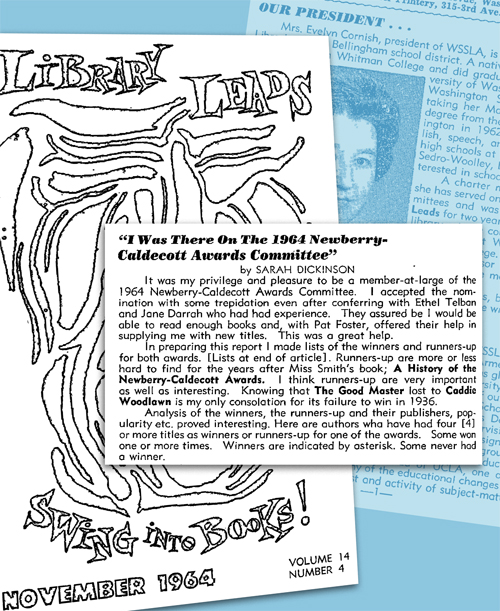I Could Tell You About the Newbery and Caldecott Committees. But I Can't. | Up for Debate
The Nobel Prize raises the veil of confidentiality after 50 years. Congress has unsealed the Warren Commission documents related to John F. Kennedy’s assassination. Do the Newbery/Caldecott records hide some sort of national security risk that’s not obvious to us?

Kathleen T. Horning
Last January I went before the Association for Library Service to Children (ALSC) Board during the Midwinter conference to propose that they consider a statute of limitations on confidentiality concerning Newbery and Caldecott Award proceedings. It’s not such an unusual idea. The Nobel Prize, for example, raises the veil of confidentiality after 50 years. Congress has long since unsealed the Warren Commission documents related to John F. Kennedy’s assassination. Do the Newbery/Caldecott records hide some sort of national security risk that’s not obvious to us? I’m not the first to suggest this. In the 1970s, the question of confidentiality was raised as children’s librarians called for more transparency regarding the awards. For a few years, the lists of nominated Newbery and Caldecott titles were printed in an end-of-the year issue of School Library Journal. (Check out the list that was published in the October 1974 magazine.) There was even talk of tape recording the proceedings so future researchers could hear them. How I wish they would have done that! I would love to have listened to the discussion of the 1975 Newbery/Caldecott Committee that chose Virginia Hamilton’s M.C. Higgins, the Great, a personal favorite. Were they aware of what a momentous decision it was? More importantly, how did they discuss what made this book truly distinguished? What did they say? I could ask the 1975 Newbery/Caldecott chair, Bette Peltola, who now lives in Minnesota. But I can’t.Also read:
Why You Don’t Want To Know More About the Newbery and Caldecott
Dan Santat, 2015 Caldecott Medal recipient for The Adventures of Beekle: The Unimaginary Friend
Let Book Awards Committee Members Blab
Ed Spicer, educator who has served on the Caldecott, Printz, and other ALA awards committees

"I Was There On The 1964 Newberry-Caldecott Awards Committee."
Click on image to download article.
© WMLA. Posted with permission
Kathleen T. Horning is director of the Cooperative Children's Book Center of the School of Education at the University of Wisconsin-Madison and the author of From Cover to Cover: Evaluating and Reviewing Children’s Books (HarperCollins, 2010). A graduate school project on identifying first editions of the Newbery Medal books inspired a lifelong passion for Newbery and Caldecott Award history, much of which she shares in ALSC online classes on the awards. She also wrote the 2011 Horn Book article “Secrecy and the Newbery Medal.”
RELATED
RECOMMENDED
CAREERS
The job outlook in 2030: Librarians will be in demand
CAREERS
The job outlook in 2030: Librarians will be in demand
ALREADY A SUBSCRIBER? LOG IN
We are currently offering this content for free. Sign up now to activate your personal profile, where you can save articles for future viewing






Add Comment :-
Comment Policy:
Comment should not be empty !!!
Roger Sutton
While I appreciate the value to researchers (and the nosy ;-) of unsealing award committee confidentiality after a given time, I'm not sure it's quite fair to do so retroactively, that is, it would be okay NOW to know what the committees of twenty-five or fifty years ago discussed. Or, in twenty-five or fifty years, to know what the committees said in 2016. As it is and was, the ALSC award committees operate under a condition of forever-confidentiality, and it doesn't seem right to break the promise that under current rules is being made to committee members. If, going forward, that condition is abridged, then, sure. But we can't change the rules retroactively.Posted : Jun 08, 2016 06:22
Jeanette Larson
I totally agree K.T. Right now little is recorded because there is no reason to do so. While I don't think there is need, or much point, to recording every blow by blow in discussions, some documentation as to why a book rose to the top or didn't would be very interesting to researchers. Even knowing what books were considered and voted "off the table" in the first round is interesting. Researchers might also find it interesting to see how much, or how little, diversity there was to the books being seriously considered. 25 years is long enough!Posted : Jun 07, 2016 12:05
Katy
Twenty five years even seems like a long time to wait, to me. Researchers wanting to work with the critical reception of recent books would be out of luck. I'd be happy with a five year moratorium.Posted : Jun 06, 2016 07:54
KT Horning
How about the written records (ballot tallies, correspondence) that's already there in the ALA Archives from the Mildred Batchelder years? Right now I can read them all but can't share any findings. I'd like to see committee members write or record memories soon after the fact, so those records could be saved for posterity, unsealed in 25 or 50 years for research. Lastly, not everyone has a bad memory. You should know that from ALSC Past Presidents' Breakfast. Peggy Sullivan and Lillian Gerhardt can both remember events from 50 years ago like they happened yesterday.Posted : Jun 04, 2016 09:02
Therese bigelow
While there may be too much emphasis on the secret keeping. Truthfully after a year who remembers much beyond the warm glow of the experience unless something negative happens during the experience. So unsealing the deliberations would be pointless.Posted : Jun 04, 2016 09:02